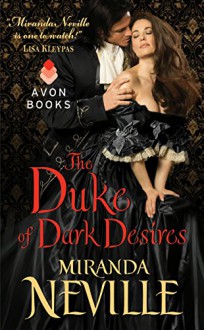
I picked this up because of this rave review at SmartBitchesTrashyBooks.com, but I didn't love it. I hadn't read the prior books in the series, which may have helped me warm up to the hero faster than I did, but I didn't have any trouble understanding the plot.
As you can tell from the publisher's blurb, the plot here is driven by the ultimate angsty conflict: the heroine's parents and sisters went to the guillotine during the French Revolution, and she has sworn to avenge their deaths by killing the Englishman who betrayed them to authorities... and of course, the hero is that man. At the start of the book, all Jane/Jeanne knows is the man's last name, Fortescue, so she poses as a governess to the sisters of the Duke of Denford, the head of the Fortescue family, in hopes of learning which of his relatives is the betrayer.
Julian, the Duke, comes across as a real douchenozzle at first. (Again, if I'd read the previous books in the series, in which he makes several appearances, I might have had a better initial impression of him.) He resents and ignores his three half-sisters, who have been abandoned by their mother into his care. He asks his neighbor (a married woman he apparently attempted to seduce in a prior book) to hire someone to look after them, and when she refuses, he advertises the position himself. However, he cares not at all about the suitability of the candidate; in fact, when he hires Jane, he cares nothing of her qualifications as a governess and only about her qualifications as his mistress. When she takes up the position, he blackmails her for kisses, refusing to keep promises to his sisters unless Jane submits to his advances.
That blackmail is even more skeevy and disturbing given Jane's history (which of course Julian, in his defense, doesn't know): Jane is no stranger to sexual coercion. When her family was captured when she was just 15, she escaped the guillotine only because the military official who arrested them took a shine to her, and offered her the opportunity to become his lover in order to save her skin.
However, for all of his douchey machinations and manipulations, Jane is the one to ultimately seduce Julian into bed. At that point in the story I still didn't really see the appeal, but she's French and enjoys sex (and okay, I do enjoy sexually-liberated heroines in historical romance, even if they're not very historically accurate), so whatever.
As their relationship develops, Julian does begin to be a better man. He takes more interest in his sisters and starts to consider their needs and feelings. He adores Jane (the suddenness and fervor of his feelings felt a little Insta-Lovey), though he doesn't trust her. Even without knowing that Jane was the person most impacted by his youthful mistakes as a young man in Paris--mistakes which culminated in the deaths of an entire aristocratic family--he seeks to expiate his conscience by turning the art collection he bought from that doomed family into a national treasure that can be enjoyed by the public instead of a privileged few.
With the sort of poetic irony often found in romance novels, both Jane and Julian individually decide they are each ready to share their secrets with the other, but before they have the chance, the exhibition of Julian's art collection (which of course Jane recognizes) brings the plot's conflict from a rolling boil to a dangerous conflagration. It is a testament to Julian's redemption that by that point I liked him enough to root for him to find a way to unravel the mess he'd made in order to have a happy ending with Jane, and I thoroughly enjoyed the last third of the book much, much more than I liked the first two thirds.
If you like a good redemption story, this one is worth checking out.

 Log in with Facebook
Log in with Facebook 






